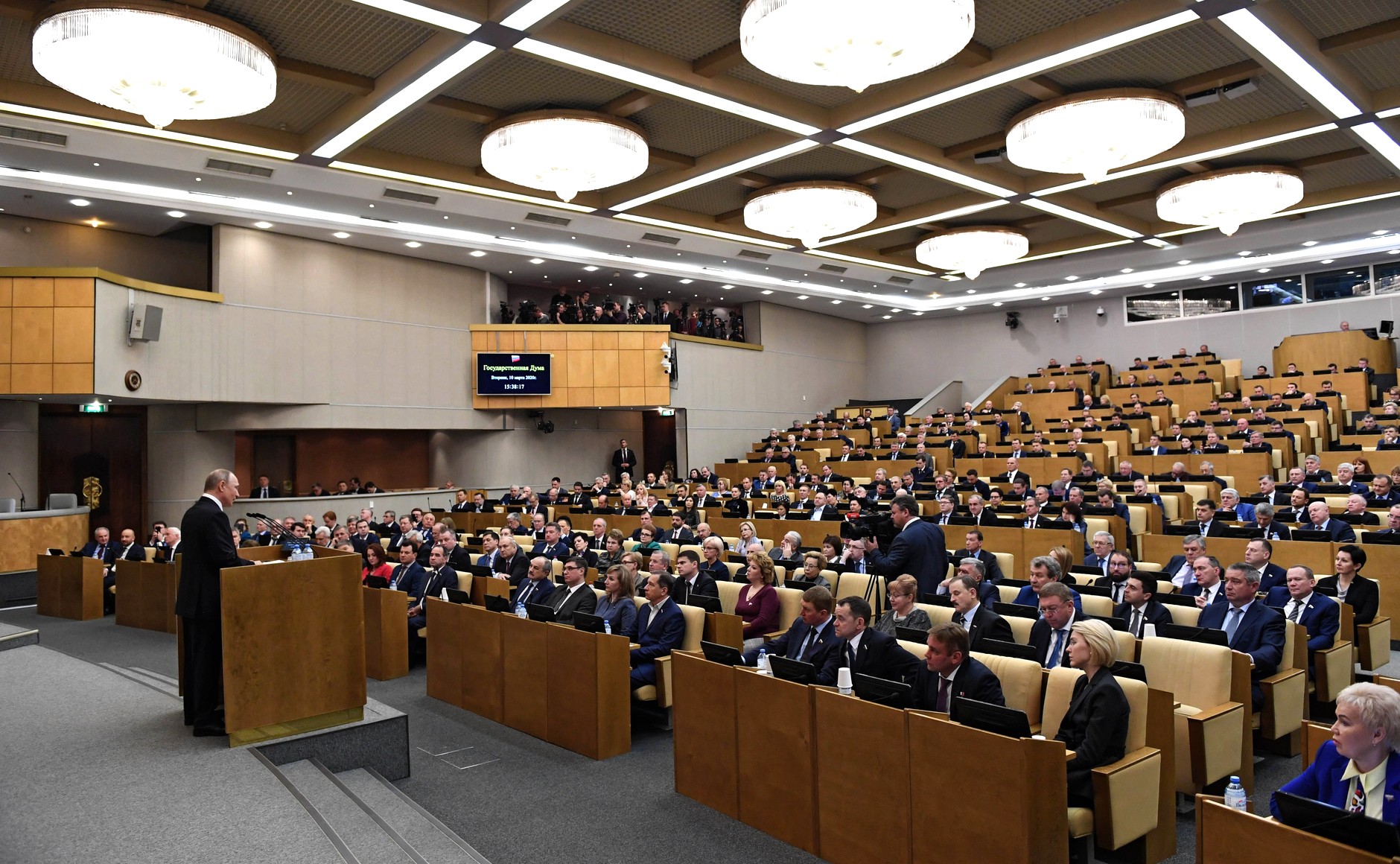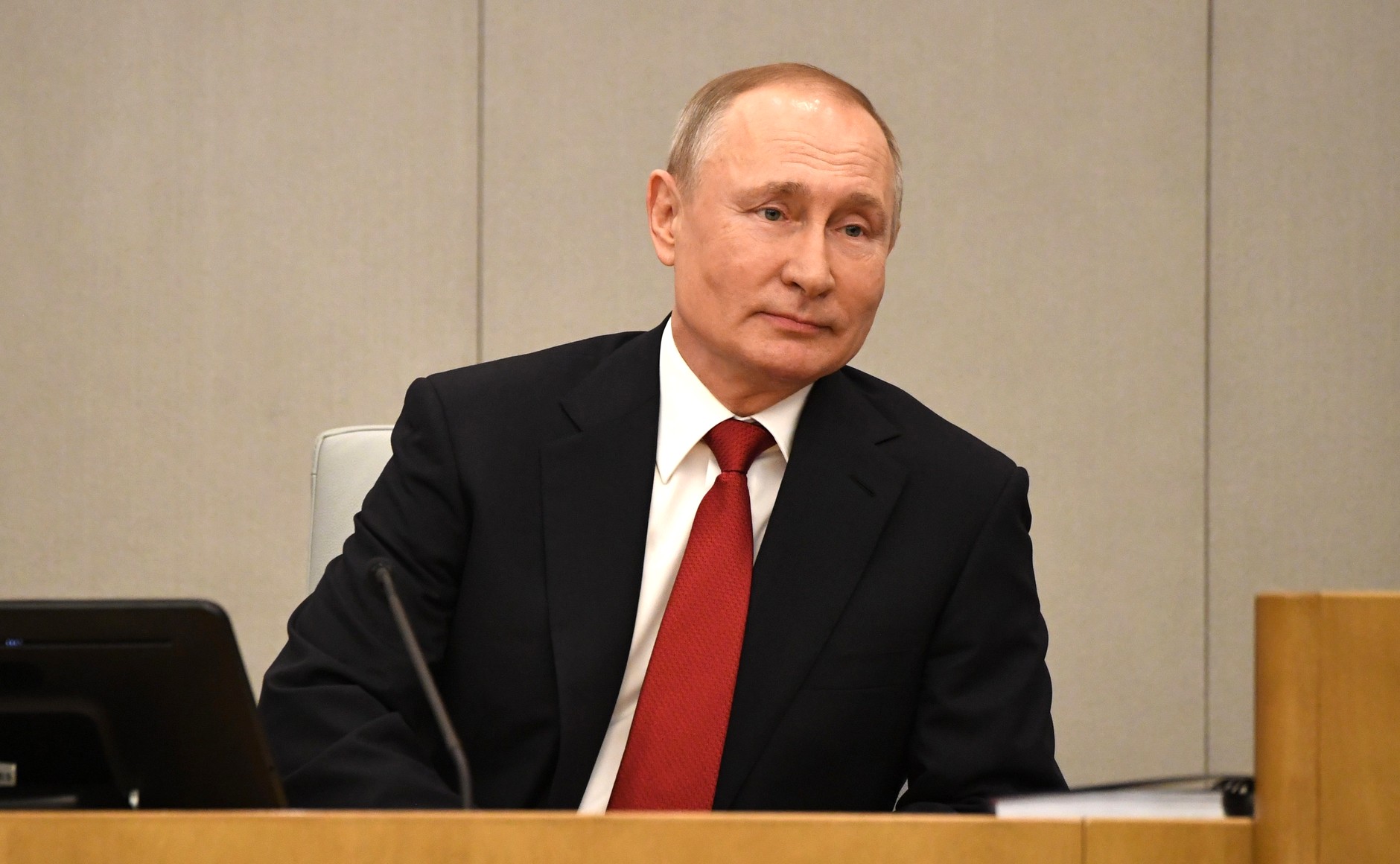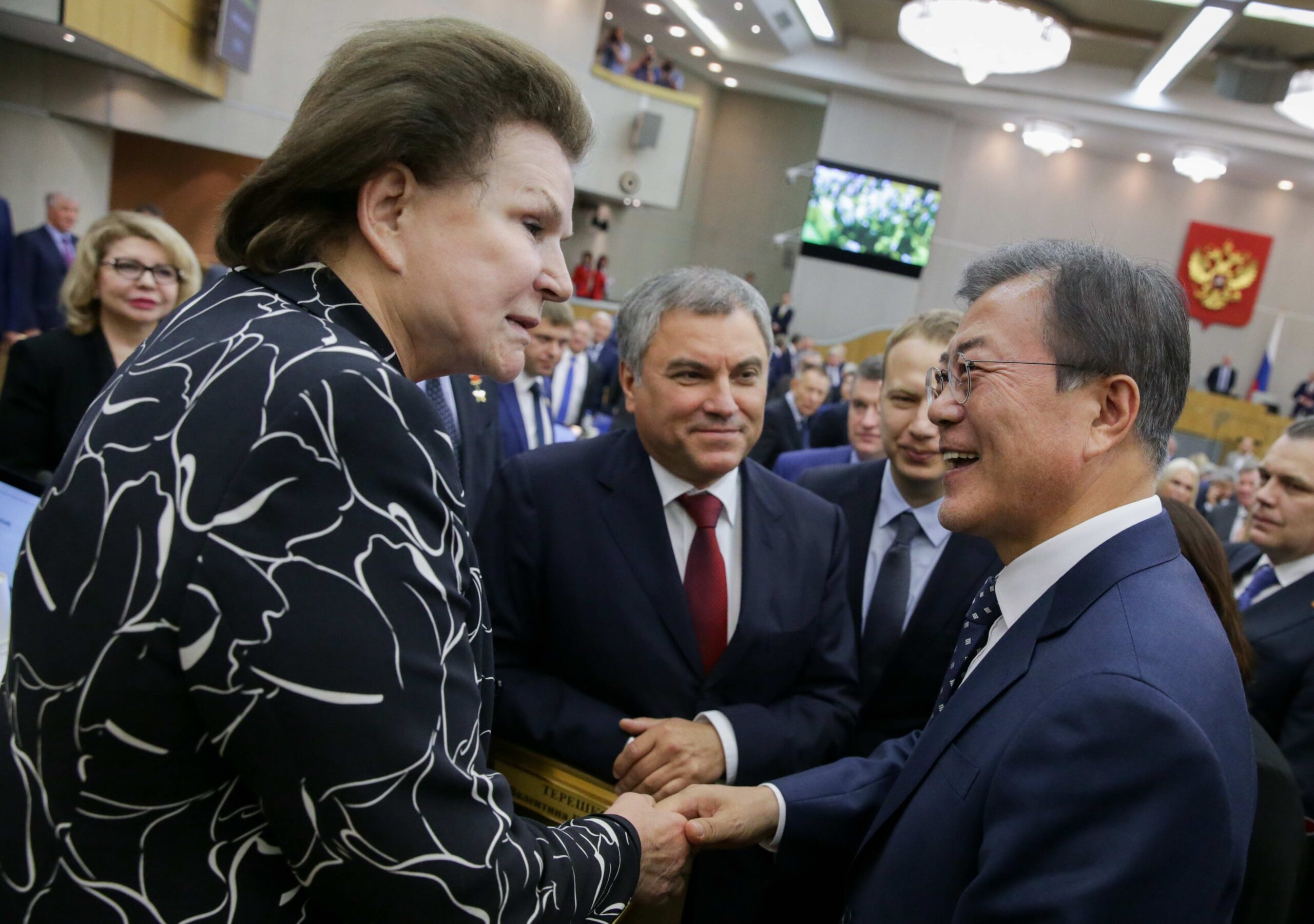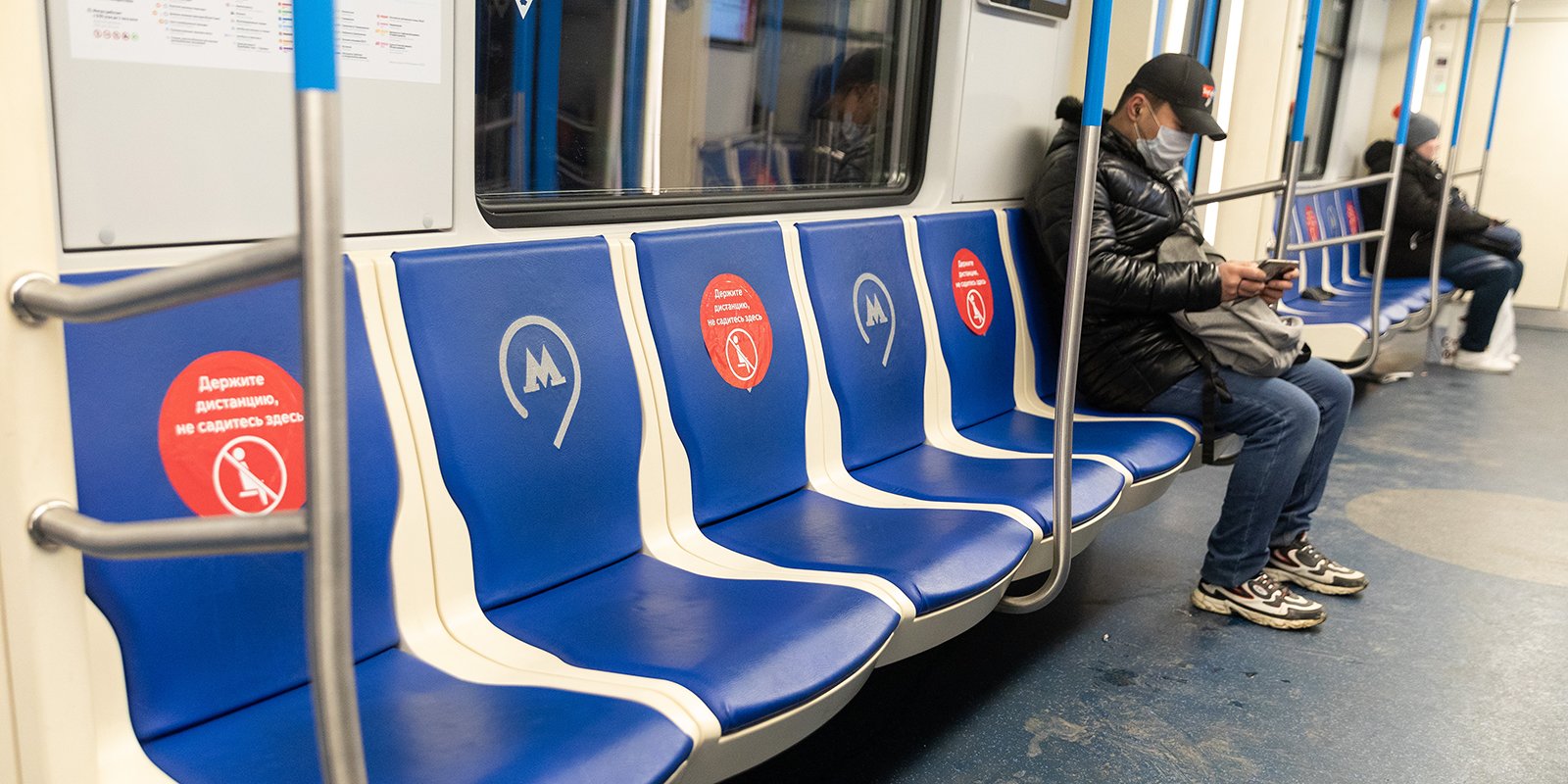In addition to the controversy over enhanced presidential powers, Natylie Baldwin covers other significant proposals now in front of voters.

Plenary session of the State Duma on amendments to the Russian Federation Constitution, March 10, 2020, Moscow. (President of Russia)
By Natylie Baldwin
Special to Consortium News
 Voting in Russia began on Friday and will conclude Wednesday on a referendum over a series of constitutional changes that would enhance the powers of the presidency, including, most controversially, allowing President Vladimir Putin to potentially remain in office for 12 more years beyond the end of his term limit in 2024.
Voting in Russia began on Friday and will conclude Wednesday on a referendum over a series of constitutional changes that would enhance the powers of the presidency, including, most controversially, allowing President Vladimir Putin to potentially remain in office for 12 more years beyond the end of his term limit in 2024.
There is more to the proposed changes, however, that bear looking at.
In mid-January, Putin announced his proposals during his annual address to the Federal Assembly. Several days later, he submitted the initial draft law to the Duma, Russia’s lower house.
The first few paragraphs reiterated some of the changes he outlined in his speech, including restrictions for individuals running for president of Russia and other major federal offices such as prime minister, cabinet members, parliamentarians, regional governors and judges.
These include candidates’ restrictions on dual citizenship and residency and, for the president, a requirement of continuous residency in Russia for at least 25 years. As others have pointed out, these rules effectively prohibit the children of the current political class from running for major office in Russia since most of them have studied and/or lived in the U.S. or Europe and have therefore had long-term residency in a foreign country.
Another amendment will require that Russia’s constitution take precedence over international law if the two are in conflict. Putin’s draft law stated:
To protect national sovereignty, it is proposed in the draft law that the decisions of interstate bodies based on the provisions of international treaties signed by the Russian Federation shall not be implemented in Russia if their interpretation contradicts the Constitution of the Russian Federation.
With respect to the expanded responsibilities of the parliament – consisting of the Federation Council (upper chamber) and the Duma (lower chamber) – the draft law summary states:
To make interaction between the representative and executive branches of power more effective, to strengthen the role of the State Duma and parliamentary parties, as well as to enhance the responsibility of members of the Government, it has been proposed that the Constitutional provisions on the procedure for appointing the Prime Minister and deputy prime ministers of Russia be amended to stipulate that candidates for these posts are appointed by the President following their approval by the State Duma.
Interestingly, there is some debate on what kind of qualitative change this represents. Professor Paul Robinson has looked at the full Russian draft submissions and made some comparisons between what the current constitutional language is and what it will be changed to. It appears to amount to a distinction without a difference:
“The words that I have emphasized in the quotation … clarify the situation: ‘the name of the candidate for prime minister will be submitted ‘to the State Duma by the President of the Russian Federation.’ In other words, everything will remain as it was, only now the Duma ‘confirms’ the candidate rather than gives its ‘consent’.”
A Presidential Republic

Russian President Vladimir Putin, March 2020. (President of Russia)
Putin emphasized in his January address, and reiterated in subsequent remarks, that though there may be room to expand some of the parliament’s authority, it is appropriate for Russia to remain a presidential republic and not a parliamentary republic:
“I think that Russia, with its vast territory, with many faiths, with a large number of nations, peoples, nationalities living in the country – you can’t even count, someone says 160, someone 190, you know, needs strong presidential power.”
The draft law also gives the Federation Council authority to investigate and remove judges for incompetence or corruption if the president recommends it:
“In addition, the Federation Council is to have the power to terminate the powers of judges of the Constitutional Court and the Supreme Court of Russia, the judges of the courts of cassation and appeal upon the recommendation of the President of Russia, if they are found guilty of acts that defame the honour and dignity of judges, as well as in other cases described in the federal legislation according to which the said persons can no longer perform their duties.”
Furthermore, the draft law allows the Constitutional Court to review proposed legislation for constitutionality prior to passage into law:
“The role of the Constitutional Court is to be strengthened by giving it the power to analyse, at the request of the President of Russia, compliance with the Constitution of laws adopted by the two houses of the Federal Assembly before they are signed by the President.”
As promised the draft law codifies that the state is responsible for providing basic social justice measures:
“To protect the social rights of citizens and ensure equal opportunities for them throughout the country, Article 75 of the Constitution is to be complemented with provisions setting forth the minimum wage in the amount not lower than the subsistence minimum of the economically active population throughout the country, guaranteeing the indexation of pensions, social benefits and other social payments, and setting out the basic principles of nationwide retirement benefits.”
Russia currently has a minimum wage but this will codify into the constitution that the minimum wage must be indexed to reflect the current minimum cost of living; in other words, it cannot be below the recognized poverty line.
Another change involves the State Council, which is currently an advisory body to the president to coordinate different parts of government and advise on critical issues. It is now to become an official executive body. Bloomberg described the changes as follows:
“At the moment, that body is a gathering of regional and national leaders headed by Putin but with largely ceremonial powers. Under the proposed changes, the Council’s role would for the first time be written into the constitution and a special federal law.
“The State Council would have the power to ‘set the main directions of the domestic and foreign policy of the Russian Federation and the priority areas of socio-economic development,’ according to the draft. The body would be formed by the president, although the proposed amendments give no indication how that process would take place.”
Prior to the Tereshkova Amendment (discussed below), there was speculation that Putin would likely keep a role as the head of this body after stepping down from the presidency in 2024. The Duma unanimously approved these changes on Jan. 23.
Hundreds of Proposals Received
The constitutional committee Putin had appointed to consider additional possible amendments and changes to the Russian constitution reportedly received hundreds of proposals on a range of issues, from both the public and those in government. The deadline for submission of those proposals was March 2. On that date, several additional proposed constitutional amendments were submitted by Putin
These new proposals, which were accepted by the Duma and are included in the national vote underway on the whole package of constitutional reforms, were obviously intended to placate certain groups, including lower-income Russians; those advocating Russian national independence; and the Orthodox Church, whose stance on certain cultural issues reflects the attitude of many Russians.
These proposed amendments include: invoking God in the document; a prohibition on the ceding of any Russian territory; defining marriage as between a man and a woman; recognition of the Russian Federation as the successor state to the Soviet Union (thereby inheriting the Soviet Union’s victory in World War II), and recognition of Russian peoples as founders of the state.
Ending Presidential Term Limit

Valentina Tereshkova with South Korean President Moon Jae-in in the Russian State Duma, 2018. (duma.gov.ru, Wikimedia Commons)
On March 10, a further development garnered even more attention when parliamentarian Valentina Tereshkova, the first Soviet woman in space, proposed that the “clock be reset to zero” on presidential terms at 2024. That would mean that Putin would be able to run again in 2024 and serve what would be the new constitutional limit of two total terms.
This suggestion seemed to throw the parliament into confusion and Putin subsequently made an unscheduled appearance at the Duma to address the issue. He then said that resetting the clock on presidential terms was possible, but would have to be approved by both the Constitutional Court and the Russian people when they voted. The Constitutional Court subsequently ruled that this move was acceptable.
Many observers thought this turn of events seemed staged. Though polls indicate that the package of amendments will likely pass the vote, there are a number of Russians who are disappointed at the ham-handed way in which this loophole for Putin to possibly remain in power is being forced into existence.
Gennady Zyuganov, the head of the Communist Party, which — together with the right-wing nationalist LDPR Party comprise the largest opposition in the country — has publicly come out against the amendments, stating that they are “disappointing” and “depressing.” He claimed none of the amendments offered by the Communists were accepted and that the process had been rushed.
Pandemic Postponement

Social distancing signs in the Moscow Metro, April 1, 2020. (Mos.ru, CC BY 4.0, Wikimedia Commons)
Because of the pandemic, the popular vote underway was rescheduled by decree from April 22 — allowing staggered voting as well as online and outdoor options at some locations in light of the Covid-19 crisis.
In late January, Putin’s press secretary, Dmitry Peskov, confirmed that a popular vote by the Russian citizenry would represent the final word on the amendments: “We primarily don’t view this vote as just a simple formality. If people believe that it is not expedient [to introduce amendments to the constitution] then that’s what it is. It is not a formality, it is indeed a vote for or against.”
The vote is not an actual referendum and there is nothing that legally requires the government to honor a popular decision to reject the changes if they were to be voted down – though it would be a PR disaster in terms of legitimacy.
The Kremlin took active steps to encourage the public to vote in favor, including airing a film on June 21 on state television, “Russia. Kremlin. Putin,” celebrating Putin’s achievements on the 20th anniversary of his leadership andproviding various incentives to get people to vote, such as food and vouchers that can be exchanged for various goods and services.
As for the intrigue regarding whether Putin will actually run again in 2024, it makes strategic sense that Putin may want to keep the political class guessing as to what exactly he’s going to do and when he exactly is going to do it to temper the jockeying for power he knows will intensify if he’s perceived as a leader with one foot out the door. Putin alluded to this recently:
“They [Russian officials] need to work rather than search for successors. … You know, I’ll say absolutely frankly now: if this does not happen [passing a respective constitutional amendment] then in some two years, I know this from my own experience, instead of a normal rhythmical work at many levels of power they will start searching for potential successors.”
In my perusal of Russian history, I’ve noted that whenever leaders wanted to institute reforms, they inevitably unleashed forces they couldn’t totally control with unintended consequences. Russia analyst Gordon Hahn writes: “The debate over systemic changes could provoke a split with the ruling elite. Such a split could revolve around disagreements between those who would prefer Putin stay at least until 2024 and take up a serious office or several offices under a new ‘caretaker’ president, and those who would prefer a more rapid departure, perhaps even with mid-term presidential elections and a minimal or no role for Putin under the next president.”
Putin may be keeping his options open in case those unintended consequences become too destabilizing.
That said, it seems that Putin remaining in power past 2024 would be a mistake on several levels, including handing his Western critics, who already call him a dictator, a cudgel to keep hitting him with. On the other hand, Putin may feel the threats against Russia emanating from Washington are so great that he cannot trust anyone else to lead the country through a perilous time.
However impressive a job Putin has done pulling Russia up from a failed state to a country with a decent standard of living and a diplomatic force on the world stage, it may ultimately be a weakness to keep focusing on only one man’s talents and savvy. It might be time for Putin to be grooming a successor whom voters might chose to continue the path Putin has set them on. New leadership can take over and continue moving Russia forward, with Putin possibly playing a role as wise elder during the transition.
Natylie Baldwin is author of “The View from Moscow: Understanding Russia and U.S.-Russia Relations,” forthcoming in April. She is co-author of “Ukraine: Zbig’s Grand Chessboard & How the West Was Checkmated.” She has traveled throughout western Russia since 2015 and has written several articles based on her conversations and interviews with a cross-section of Russians. She blogs at natyliesbaldwin.com.
The views expressed are solely those of the author and may or may not reflect those of Consortium News.
Please Contribute to Consortium
News on its 25th Anniversary


BBC and Euronews are not able to find one Moscovite who voted for the new constitution.
Now that is objective, liberal, honest, democratic, free speech, European journalism today !
Once again I marvel at the Russian people managing to come together to peacefully continue their upward swing as a country. They show us how it’s done. President Putin, although I can see how some might come up with the term “dictator” for staying on these many years, is fresh air to me and I hope he does stay on as President. He must have plenty of headaches as a man in his shoes would. My impression is he handles them with calm coolness and pure statesmanship. This voting appears here and on RT.com as an authentic outcome of true Democracy.
Thank you Don for being honest and for showing Russia to be the great Nation that it is….unlike the West who continue to push propaganda through all means to try and demonize Putin. I read the speech and also have followed the transparent steps that Russia takes for it’s citizens. Western Governments have sold their citizens out long ago, so we know who the enemy of the people truly is.
We in the west seem to abhor (well, we do) any leftish (not left necessarily) constitutional government (since when did the American PUBLIC have a chance to decide on any part of the US Constitution, might I ask? Americans only got the chance to vote – 2 parties only, mind – for Senators in 1913; and we have zero say in who the Justices of the Supreme Court will be, even though they, essentially, adjudicate on what is or is not constitutional and thus affect us all) that doesn’t run along the lines we decide are the right ones. Mind, we’re perfectly happy with the Pinochets of this world…
Yes, Putin needs very much to be choosing and grooming (unpleasant word) a really good, intelligent, diplomatic and *strong* successor. Someone who won’t cave to or who doesn’t believe in the westernizing, Friedman “Shock Therapy” types ready to strip Russia of its assets for their own and their western supporters benefit. Perhaps he hasn’t yet found one?
Where does the proposed amendment reset the presidential term?
Here is a breakdown in English from the Russian gov official site: hXXp://duma.gov.ru/en/news/48039/
Never mind, I found it.
Nationalizing the greedy private banks would be essential for establishing socialism. I’m all for it.
This article is very informative, thank you. These amendments appear hasty, incomplete, and contain important errors.
The success of a good president should never supercede deeper consideration of power checks and balances.
There is no greater danger to a democracy than concentrating policymaking power in one person, however good.
1. Checks and Balances on executive, legislature, and judiciary are essential and must be Engineered as in an airplane.
2. The size and diversity of a country does Not argue for “strong presidential power” which permits future tyranny.
3. A president-appointed State Council to set policy “directions” would disastrously usurp most legislative power.
4. If PM candidates are Duma proposed, President chosen, and Duma approved, the power is balanced, but the Duma should have the power and Force to check all executive powers and to remove administrators when necessary.
5. It is good to have checks on the judiciary, but never presume the “honour of judges” who often seek power to abuse.
6. The Constitutional Court should Advise and decide Constitutional compliance of proposed laws, before they are voted or signed, without any request of the President.
Sam, I hope that the Russian Duma, the Russian president and the Russian judiciary all have the good sense to limit the role of MONEY in the selection process (whether elections or appointments) of every public servant in their land. If their system devolves to the point where all government officials are mere mercenaries for the oligarchs who financially support them, they will soon have the chaos and injustice we live under in the United States. Yes, ensure checks and balances between the inevitable branches of government, and also between competing political factions, for that matter. Let opposing ideas compete in the national forum, but do not allow anyone to fill those roles simply because they were blessed with the patronage of a handful of filthy rich capitalists, for only the interests of those elites, and not the people, will be served. Use the model of the US constitution and its government as a cautionary example of what not to emulate.
Yes, Realist, I should include mechanisms of monitoring public officials and associates for life for financial and other influences. Also suggest checks and balances within branches and administrations, as multiple top-level administrative committees per administration, and required viewpoint-balancing in all matters in all branches, which work far better than weak judiciary and Comgress “balancing” a power-seizing executive.
WHY ARE GOVERNMENTS BOTHERING TO WASTE TIME IN WRITING COSTITUTIONS WHEN THEY DO NOT FOLLOW WHAT IS IN IT. LAWS ARE IN PLACE BUT THE HIGHEST AUTHORITY IS NOT THE SUPREME COURT.PRESIDENTS ,PRIME MINISTERS BREAK LAWS AND THEY DO NOT FACE INDICTMENTS. ALL A WASTE OF TIME, POWER SEEMS TO COME ONLY AT THE END OF A GUN. THE WINNER IS THE ONE WITH THE GREATEST MILITARY POWER, BUT THERE IS NO ONE WITH MORE POWER THAN THE REST. WHEN WILL THESE MORONS STOP TRYING TO BE THE WINNER. CURRENT CONFRONTATIONS BETWEEN USA/RUSSIA/CHINA CAN LEAD TO THE END OF LIFE ON PLANET EARTH.
Russia very carefully follows its constitution
What about nationalizing the Russian Central Bank, which is constrained by subservience to the dollar?
To have sovereignty, any country needs a bank owned by the people, not private bankers.
That question applies NOT only to Russia !
The Russian Central Bank is owned by the people. I’m not sure where you got your info.
We don’t need Nate Silver to predict: Whatever the Russians decide, Washington will not approve.